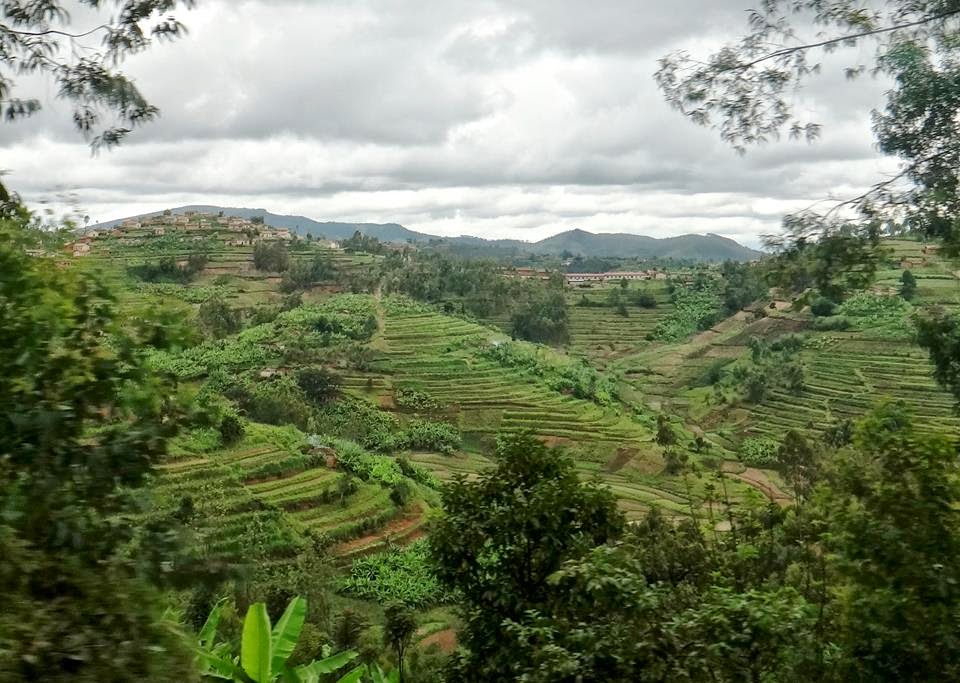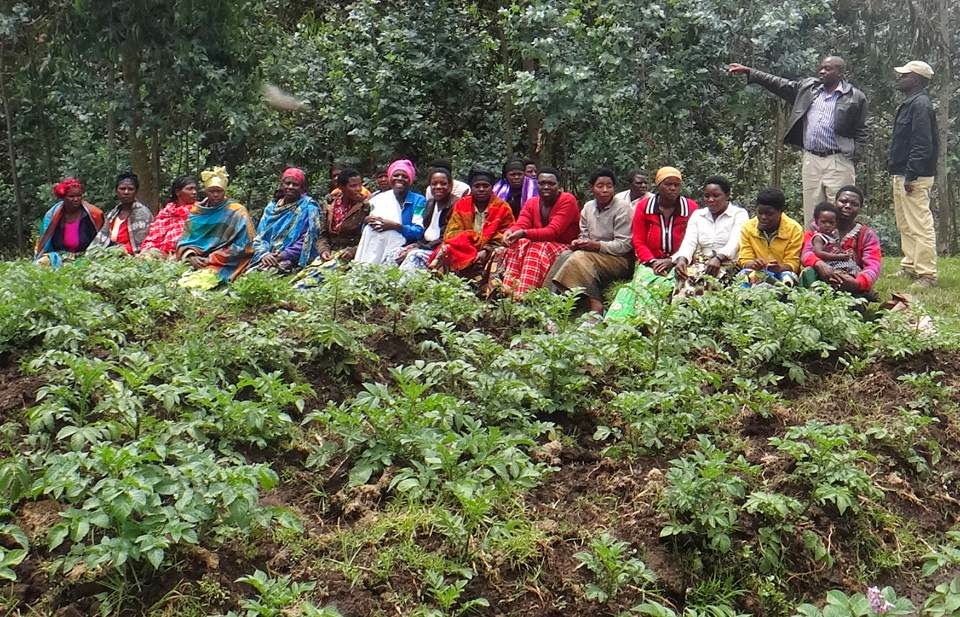Forbes Magazine On-Line Edition is talking about TSSH.
Check this out...
Check this out...

What Do African Farmers Want? More Manure
www.forbes.com
A
new initiative is empowering African entrepreneurs and farmers through
the provision of livestock as part of an interest-free pay-it-forward
loan. Each sheep or goat provides the farmer with manure for crops -
leading to a general improvement in quality of life.
Entrepreneurs 274 views
What Do African Farmers Want? More Manure
Comment Now
Follow Comments
An
expanding charity initiative is helping African agricultural
entrepreneurs one at a time. The Guardian Project Foundation’s
initiative: The Shit Starts Here (SSH)
works as a pay-it-forward scheme with farmers given a female sheep or
goat essentially as an interest free loan. Once that female reproduces,
the owner then pays it forward by gifting a female offspring on to
another farmer.
SSH works with various cooperatives to organise the distribution of the livestock. These are typically women led cooperatives – extending the social impact of the project by economically empowering rural women – but SSH has also started to work with cooperatives set up to help ex-rebel soldiers re-integrate with society.
The initiative is driven by three main objectives, says Rita Rayman, who – along with her husband Jeff – cofounded the Guardian Project Foundation. The couple strives to ensure that the project has the widest social and environmental impact possible, is as self-replicating and requires as little external input as possible, and that it works on a local basis to ensure sustainability.
As well as attempting to help empower women and re-integrate former rebel soldiers, the project can also demonstrate direct influence on forest conservation, protection of endangered species such as gorillas through cutting down on poaching and an increase in general living standards.
One of the main benefits farmers derive from the livestock – as referenced in the name of the initiative – is access to quality animal manure. This can be enough to increase crop yields by as much as 300%, says Rayman. It also reintroduces nutrients to depleted soils, meaning farmers do not have to clear forest for new fields every few seasons.

Equally the increased crop yield, as well as the animals themselves,
help to create stable communities. This has led to a reduction in
bush-meat poaching and illegal forestry in protected areas – earning an
endorsement from the Jane Goodall Institute. “[B]y providing sheep to
farmers who compost the manure into fertilizer, crop yields increase,
food production increases, and people are able to generate an income. I
believe that these results decrease the need for poaching and create
stable communities which work with us to protect and conserve the
environment ,” says Goodall. “The Jane Goodall Institute’s success in
protecting habitat for chimpanzees in Africa depends on creating
programs that are controlled and embraced by the local people.”
The increased income and greater stability in the communities involved in the project has led to significant improvements outside farming and food. Selling excess offspring can help cover many other expenses. “selling one sheep in Rwanda can pay for healthcare,” says Rayman. “Immediate life improvements will happen. We were talking to families in Uganda who have been able to put all their kids in school this year and pay for school improvements as a result.”
The Raymans are attempting to make the project self-sufficient. “The idea is for it to be able to keep going even if we were to never make it back to Africa,” says Rayman. The Guardian Project Foundation is able to do this because of the relatively simple, straight-forward nature of SSH as well as the dedicated volunteer staff it has on the ground in Africa, Rayman adds.
“If we didn’t have trusted volunteers on ground, it wouldn’t work. We’re wiring substantial amounts of money relative to their positions $10,000 to $12,000 is a lot of money,” Rayman says. “But there is not a lot of room for corruption anyway. It’s a simple formula, 100 cents of every dollar donated is spent directly on animal, transport or medical needs – there’s none spent on admin overhead – and full accounts are available on request.”
In order to ensure that SSH has the biggest impact it can have and remains self-replicating, it is very important for the organisation to work on a micro-local level. This enables it to tailor offerings to meet the unique individual challenges of each village or area. For example, SSH offers sheep or goats to cooperatives depending on which animal and breed would best fit local conditions.
This attention to local variations can also be seen in wider strategic decisions. For example, although SSH does not work in disaster areas, it does operate in post-conflict regions. This means that the Guardian Project must be careful about how it goes about expansion. “You don’t want to be adding to the volatility in regions such as the Eastern Congo area,” says Rayman. “You don’t want to inadvertently destabilise area – 500 goats equals free food for rebel groups and you don’t want to accidentally invite them in.”
 Further down the line other challenges may present themselves. SSH is
about sustainability but in the long-term, continued success could
potentially lead to problems. “One of the first things we discuss is
what are the sustainable livestock levels for the local area,” says
Rayman. “As the project expands from community to community, with 2,000
paying forward to another 2,000 every two years, perhaps this can become
a sutainability issue. But none of these subsistence farmers are going
to become goat or sheep barons. Three females are going to generate the
amount of ferteliser they need. The rest of the offspring are going to
be eaten or sold at marketplace.”
Further down the line other challenges may present themselves. SSH is
about sustainability but in the long-term, continued success could
potentially lead to problems. “One of the first things we discuss is
what are the sustainable livestock levels for the local area,” says
Rayman. “As the project expands from community to community, with 2,000
paying forward to another 2,000 every two years, perhaps this can become
a sutainability issue. But none of these subsistence farmers are going
to become goat or sheep barons. Three females are going to generate the
amount of ferteliser they need. The rest of the offspring are going to
be eaten or sold at marketplace.”
The eventual possibility of creating too much livestock is a long way away and, in the meantime, there is much to do. SSH estimates that a single animal can have an impact on as many as 12 people and that the project has helped 70,000 so far already. Thus far SSH is in Rwanda, Uganda, the Democratic Republic of the Congo (DRC). It is exploring moving into Togo as well as Ethiopia in the near future. But there is much work to do before it achieves its end goals.
SSH works with various cooperatives to organise the distribution of the livestock. These are typically women led cooperatives – extending the social impact of the project by economically empowering rural women – but SSH has also started to work with cooperatives set up to help ex-rebel soldiers re-integrate with society.
The initiative is driven by three main objectives, says Rita Rayman, who – along with her husband Jeff – cofounded the Guardian Project Foundation. The couple strives to ensure that the project has the widest social and environmental impact possible, is as self-replicating and requires as little external input as possible, and that it works on a local basis to ensure sustainability.
As well as attempting to help empower women and re-integrate former rebel soldiers, the project can also demonstrate direct influence on forest conservation, protection of endangered species such as gorillas through cutting down on poaching and an increase in general living standards.
One of the main benefits farmers derive from the livestock – as referenced in the name of the initiative – is access to quality animal manure. This can be enough to increase crop yields by as much as 300%, says Rayman. It also reintroduces nutrients to depleted soils, meaning farmers do not have to clear forest for new fields every few seasons.

The increased income and greater stability in the communities involved in the project has led to significant improvements outside farming and food. Selling excess offspring can help cover many other expenses. “selling one sheep in Rwanda can pay for healthcare,” says Rayman. “Immediate life improvements will happen. We were talking to families in Uganda who have been able to put all their kids in school this year and pay for school improvements as a result.”
The Raymans are attempting to make the project self-sufficient. “The idea is for it to be able to keep going even if we were to never make it back to Africa,” says Rayman. The Guardian Project Foundation is able to do this because of the relatively simple, straight-forward nature of SSH as well as the dedicated volunteer staff it has on the ground in Africa, Rayman adds.
“If we didn’t have trusted volunteers on ground, it wouldn’t work. We’re wiring substantial amounts of money relative to their positions $10,000 to $12,000 is a lot of money,” Rayman says. “But there is not a lot of room for corruption anyway. It’s a simple formula, 100 cents of every dollar donated is spent directly on animal, transport or medical needs – there’s none spent on admin overhead – and full accounts are available on request.”
In order to ensure that SSH has the biggest impact it can have and remains self-replicating, it is very important for the organisation to work on a micro-local level. This enables it to tailor offerings to meet the unique individual challenges of each village or area. For example, SSH offers sheep or goats to cooperatives depending on which animal and breed would best fit local conditions.
This attention to local variations can also be seen in wider strategic decisions. For example, although SSH does not work in disaster areas, it does operate in post-conflict regions. This means that the Guardian Project must be careful about how it goes about expansion. “You don’t want to be adding to the volatility in regions such as the Eastern Congo area,” says Rayman. “You don’t want to inadvertently destabilise area – 500 goats equals free food for rebel groups and you don’t want to accidentally invite them in.”

Manure pit with treatment hose (Photo credit: Wikipedia)
The eventual possibility of creating too much livestock is a long way away and, in the meantime, there is much to do. SSH estimates that a single animal can have an impact on as many as 12 people and that the project has helped 70,000 so far already. Thus far SSH is in Rwanda, Uganda, the Democratic Republic of the Congo (DRC). It is exploring moving into Togo as well as Ethiopia in the near future. But there is much work to do before it achieves its end goals.














































